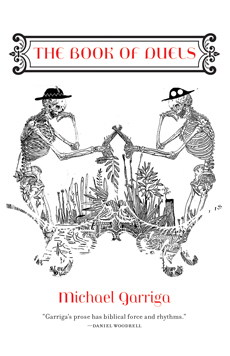
|
The act of dueling—engaging in a deadly courtship, where one is left standing—is both counterintuitive to human nature, as it conflicts with our survival instincts, yet it’s the product of arguably our most flawed characteristics: pride, anger, jealousy, envy, etcetera. Michael Garriga’s The Book of Duels explores the psyche of those willing to walk the paces, their lives “a two-sided coin flipped by Fate,” as they move toward what could be their final moment. The duelists: cuckolds, former presidents, railway men, even the author himself, speak in eloquent soliloquy of razor-sharp prose while contemplating the fleeting world and the loved ones they may leave behind, the momentous force their up against, and, of course, their legacy. Garriga inhabits his characters as seamlessly as a ventriloquist and gifts them with speech and experience, where they’re righteous yet guilty, afraid but stubborn, and, likely at their most vulnerable, when they’re human. Garriga’s work is arguably at its best when subverting the old western depiction of this deadly tango—two cowboys, back-to-back, pacing the center of town, a tumble weed, the quickest to draw is the quickest to live. While The Book of Duels is not short on these classic duels: pistols or blades drawn, the duelists staring each other down “like the last two lovers alive,” the decidedly more mundane or domestic moments reimagine the art of the duel. A divorce, childbirth, a game of chicken, all transform the expected kill-or-be-killed mentality into the battles that rage up in our daily lives, like fisticuffs and threats of litigation over a child’s toy at Toys ‘r’ Us, or during a dispute in couple’s therapy over the end of a marriage clamped “tight as a chastity belt.” Just as the material of the work blurs the notion of an actual duel, the prose itself—smooth as a bullet and sharp as a rooster’s spur—is deeply poetic in sound and structure. Garriga’s ear for rhythm and cadence, as finely tuned as Robert Johnson’s guitar, is the momentous force behind the mediations, the dialect and colloquialisms, and the nuances of ancient semantics. Pitch perfect in its reinvention of the lost voices of both famous historical figures—John Henry, Don Quixote, Rasputin—and people as common as our neighbors—trial attorneys, Vietnam vets, physicians—the collection of vengeful individuals wax poetic over the accumulated moments of their lives, some heartbreaking and others victorious, that lead to this one moment: one that may start with a gun barrel or a prison yard shank, and then end with a sigh of relief or, worse yet, nothing at all. The Book of Duels does not ask the reader to simply take this “one bullet in this one pistol in this one life.” It also commands the reader to bear witness as these men and women, mystics and biblical juggernauts, figures of folklore and animals, are challenged, be it by the rev of an engine or a glove slap, to lose it all—their respect, their prosperity, their honor, and, not the least of all, their lives. As the contests escalate, each character can “see the light of freedom,” but no one is “willing to let go of this darkness.” Whether it happens to transpire in Europe 1336 or in rural Louisiana in 2008, duelists and readers alike enter a primal cage, instinct takes over, and life, for someone, will never be the same. Count out ten paces. Read the book. Count out ten more. And then read it again. Eric Morris teaches writing at The University of Akron. His work has appeared or is forthcoming in The National Poetry Review, Heavy Feather Review, Dressing Room Poetry Journal, Whiskey Island, The South Dakota Review, Puerto del Sol, The Laurel Review, Pank, Post Road, Thrush, The Jet Fuel Review, The Collagist, Anti-, Devil's Lake, and others. Also by Eric Morris: Review of Big Ray by Michael Kimball Review of The Louisiana Purchase by Jim Goar |
|
